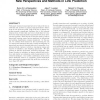Free Online Productivity Tools
i2Speak
i2Symbol
i2OCR
iTex2Img
iWeb2Print
iWeb2Shot
i2Type
iPdf2Split
iPdf2Merge
i2Bopomofo
i2Arabic
i2Style
i2Image
i2PDF
iLatex2Rtf
Sci2ools
119
click to vote
KDD
2010
ACM
2010
ACM
New perspectives and methods in link prediction
This paper examines important factors for link prediction in networks and provides a general, high-performance framework for the prediction task. Link prediction in sparse networks presents a significant challenge due to the inherent disproportion of links that can form to links that do form. Previous research has typically approached this as an unsupervised problem. While this is not the first work to explore supervised learning, many factors significant in influencing and guiding classification remain unexplored. In this paper, we consider these factors by first motivating the use of a supervised framework through a careful investigation of issues such as network observational period, generality of existing methods, variance reduction, topological causes and degrees of imbalance, and sampling approaches. We also present an effective flow-based predicting algorithm, offer formal bounds on imbalance in sparse network link prediction, and employ an evaluation method appropriat...
Related Content
| Added | 15 Aug 2010 |
| Updated | 15 Aug 2010 |
| Type | Conference |
| Year | 2010 |
| Where | KDD |
| Authors | Ryan Lichtenwalter, Jake T. Lussier, Nitesh V. Chawla |
Comments (0)

